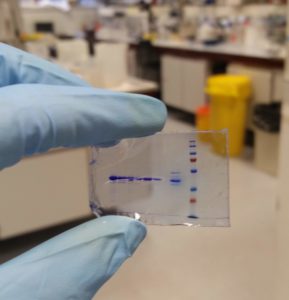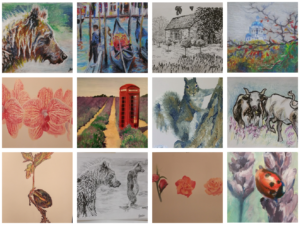Our next WRDTP student rep profile is here.. This week we are introducing you to Sarah Gratton, a long-standing DTP rep with a passion for wildlife conservation!

Sarah joined the DTP in 2017 coming from Durham University. Based at the University of Sheffield, she continues to pursue challenging work within the field of microscopy with a couple of papers already under her belt. Sarah wants to tell the wider world that PhD students matter and wants to chat to YOU if you’re interested in becoming a rep too!
Check out our question and answer session in full!
What inspired you to go into Science?
I’ve always found it extremely satisfying to learn how things work, especially when it comes to living things. When I originally chose to study Biology at university I imagined I would become an ecologist, however I got distracted by my fascination of peering inside the complexities of a living cell. I always wanted to ‘zoom in’ to uncover more detail. Now I’ve found myself in a field concerned with near-atomic resolution I think I’m happy I’ve gone far enough!

If there was a project you could do with unlimited resources and access, what would you want to do?
I have a feeling this question might be probing for a project at least vaguely related to my PhD… but I’m going to go completely off topic! Taking it down a notch from ‘Project: Save the world!’, I would love to do something to promote wildlife conservation on whatever scale I could. Ecosystems desperately need restoring worldwide. I’d probably start with terrestrial habitats, since those are the ones I can most relate to. I have in mind a mixture of rewilding areas for nature with limited human interference and a gradient of natural and urban ‘green spaces’ for people to enjoy. I’d place a lot of emphasis on connectivity between the areas where wildlife can thrive. I’d definitely incorporate sustainable agriculture into this project too. When can I start?
What advice would you give to new starters?
I think a key piece of advice when you’re starting out is to expect everything to take a lot longer than you think it will! Don’t be discouraged if progress feels slow.
How do you relieve stress?
For me, spending time with other people is the best way to relieve stress and feel a bit happier! I’ve found it vital to have a good support network, and never more so than while I’ve been working on my PhD project. Chatting with people – my partner, friends, family, colleagues, acquaintances, strangers even – has served as a great distraction when I’ve found myself consumed with something that’s been stressing me out. Listening to other people often helps to restore some perspective about my own issues – I find it’s easy to get worked up over things that aren’t really that bad an issue. On occasions I’ve received really helpful advice that has helped me through a stressful situation. Having a good vent every now and then (to someone who doesn’t mind listening!) can be pretty therapeutic and on some occasions has allowed me to reflect and have a good laugh at myself after realising I’ve got worked up over little things. Just having other people around or doing something together can be good stress-relief too. The great thing is, everyone benefits because it’s not a one-way process.

What’s one aspect of doing a PhD you wish more people knew about?
I think a lot of people who haven’t done a PhD, or don’t work with PhD students, have no idea what a PhD actually involves! I think the biggest misconceptions come from the fact that we are called PhD ‘students’. I have lost count of the times where I have told someone I am a PhD student and got a response along the lines of “Oh, trying to be a student forever then?” and implications that I’m simply trying to avoid ‘real work’ and tax. As well as responses like this having the effect of making you feel undervalued, it can also lead to frustrating misunderstandings in cases when you need to declare your occupation and income – like when renting a property and, as I’ve recently found out, getting married. ‘Scientific research’ usually gets a much better response if I manage not to say the word ‘student’ or ‘university’. Sometimes, when people ask me what I do, I find it easier to just dodge the question.
Why did you decide to become a student rep?
A year into my PhD, I received an email from a previous Sheffield student rep asking if I’d like to take over when they stepped down. I had contacted them about volunteering to help at the upcoming symposium so I think that’s why they asked me! I saw it as an opportunity to expand my transferable skillset and I was interested to find out directly how the DTP was being run, so I took up the role.
The key task of a student rep is to organise the White Rose symposium held in winter every year. This can be quite a big task, but it’s rewarding to see the symposium day go well. The reps also attend the Management Board meetings which are held a few times a year to address how the DTP is run. Our biggest input in these meetings is usually relaying feedback we’ve had from fellow students about how training days/course are run as well as discussing any proposed changes. (Do contact one of us if you have any ideas! The full list of student reps can be found in every DTP newsletter.)
I’ll be staying on as a student rep until our next symposium in December 2020, then I’ll be stepping down to focus on finishing my PhD. So, on that note, if any Sheffield PhD students are thinking of taking up the role, please contact me (srgratton1@sheffield.ac.uk) or Amber to let us know! Also, remember you can contact the White Rose student reps for your institution if there’s anything you’d like us to raise at our meetings, or if there’s anything else we might be able to help you with.
